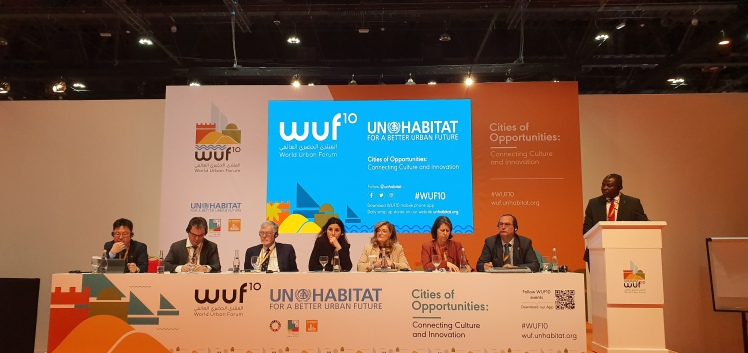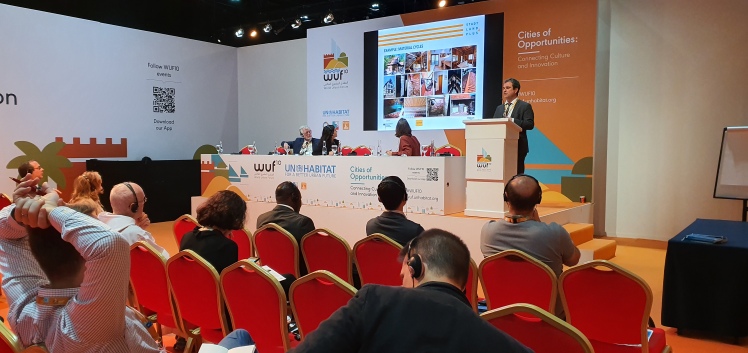The main objective of the session was to present how stakeholders across different sectors work in the urban-rural continuum and how the Urban-Rural Linkages: Guiding Principles and Framework for Action was relevant to their particular work and projects.
The session included the participation of experts and representatives of national governments, UN agencies, international organizations, universities, and the private sector, with speakersMs. Oenema Stineke (UNSCN), Ms. Cecilia Marocchino (FAO), Prof. Robert E.B. Lucas (KNOMAD, World Bank), Dr.-Ing. Uwe Ferber (StadtLand GmbH), Mr. Ignacio de la Puerta (Basque Country Government, Spain), Dr. Junyoung Choi (Korea Land & Housing Corporation), Dr. Sandra Piesik (3 Ideas B.V), Dr. Huang Pei (Xi’an University of Architecture and Technology), and Mr. Lovati Marco (Dalarna University). Mr. Pan Younshui from Songyang county in China contributed to the session making a video presentation.
The session was moderated by Mr. Remy Sietchiping (UN-Habitat).

Some of the themes that were discussed include the integration of nutritionists and planners, a systemic approach to food agenda, the connection between food demand to supply and farmers and market, rural-urban migration, and urban-rural partnerships.
The panelists also highlighted themes such as economic approaches based on the local markets, preservation of biodiversity and environmental resources; housing approaches for urban and rural revitalization, and indigenous culture and knowledge as a base for understanding and connecting the urban-rural continuum.
Ms. Oenema Stineke opened the session by calling to action the use of a territorial lens in nutrition policy and programs, uplifting inclusive urban-rural finance to address poverty, hunger and malnutrition and to include nutrition in the context of urban-rural linkages.
“Planners and nutritionists need to jointly improve their understanding and start planning and working together for more positive impact of policies and programmes.” (Ms. Oenema Stineke, UNSCN)
Next, Ms. Cecilia Marocchino introduced systemic approaches to the food agenda to cover multiple layers including production, processing, distribution, consumption and disposal of food.
She shared the case of Lima, Peru which began with the request of Lima’s local government seeking advice on integrating the food agenda into their policy. Now there is a platform of cities, which work together towards shortening the food supply chain and improving the connection between food supply and demand (e.g. better linkages between farmers and the market). Identified as an opportunity by this network of cities, they envision to strengthen these Urban-Rural Linkages by building supporting infrastructure.
“Cities together, they can do better. Local governments should “go beyond city level”. (Ms. Cecilia Marocchino, FAO)
Prof. Robert E.B Lucas highlighted that many countries today have policies in place that attempt to discourage, or even reverse rural-urban migration. However, he affirmed that:
“The evidence indicates that rural-urban migration is a minor contributor to urbanization expansion in most contexts; rather, reclassification of rural areas as urban dominates.” (Prof. Robert E.B Lucas, KNOMAD, World Bank)

Mr. Ignacio de la Puerta introduced the Basque county’s territorial agenda, guideline and implementation process.
Dr.-Ing Uwe Ferber shared his perspectives on using markets and technology to improve the urban-rural continuity. He introduced five action fields of sectoral partnerships in urban-rural areas: sustainable land use, regional food systems, regional value generation circular economy and integrated infrastructures and services. He concluded his intervention by introducing the conference “Urban-Rural-Partnerships” (URP 2020), which will take place in Leipzig, Germany, 25-27 November 2020.“Economical approaches based on existing local markets, the preservation of biodiversity and environmental resources also work as new cultural spaces and agro-tourism. This new topography is becoming and generating a new network for the connection between urban and rural.” (Mr. Ignacio de la Puerta, Basque Country Government, Spain)
Dr. Sandra Piesik introduced her research on the Arab Region by questioning how indigenous people in the Arab region have survived in a rapidly changing world?
“Palm leaves have been used in ingenious ways to create habitable structures that have endured for generations, providing shelter in the extreme climate of the Arabian-peninsula for centuries.” These trees at the same time have served as a “connectors” between urban and rural areas. - Dr. Sandra Piesik (3 Ideas B.V)
Building on Sandra Piesik’s discussion, Remy Sietchiping added that the “discussion should connect these heritages to new cutting-edge technologies, which could demonstrate the fulfilment of SDGs and NUA.”

Dr. Huang Pei introduced his research on low-carbon rural construction as a way of co-existence of nature and sustainable economic development in rural areas. He stressed the importance of these constructions for mitigating climate change.
Mr. Lovati Marco from Dalarna University discussed how to make effective, profitable and fair micro-grids using agent-based modelling in rural areas. An agent-based model (ABM) is a class of computational models for simulating the actions and interactions of autonomous agents with a view of assessing their effects on the energy system.
“Using agent-based modelling will benefit people and households in rural area by establishing a local grid, a local energy community and a local energy market.” (Mr. Lovati Marco, Dalarna University)
Following the panelists’ discussion, the audience was invited to participate in a question and answer round. The audience raised questions on the role of cutting-edge agricultural technologies and their impact on food security.
Although the panelists expressed positive views about the impact of new technologies to ensure food security, Ms. Cecilia Marocchino from FAO stressed the need to prioritize when using these technologies:
“We need to be inclusive to address these issues and consider the most vulnerable and marginalized regions, communities and people”
The audience also pointed out the importance of addressing informality in the Global South.
Members of the audience stated that the lack of information and mapping is one of the major challenges when envisioning strategies to reduce informality. Furthermore, Ms. Oenema Stineke (UNSCN) emphasizes the role that urban-rural linkages play in addressing informality, for these linkages have many layers of interdependent issues.
Mr. Remy Sietcheping closed the session by highlighting that:
“All stakeholders and experts from the different areas should be aware of each other since there are many different entry points to enhance urban-rural linkages and there are more ways to handle this. Hence, governance is very critical in future discussions.”
Follow @PLG_UNHABITAT and @UNHABITAT on Twitter and tweet using #WUF10 #URL_WUF10

